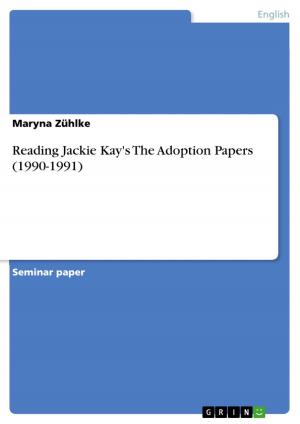Word Geography of England and Deutscher Wortatlas - A Comparison
Nonfiction, Entertainment, Drama, Anthologies| Author: | Alena Friedrich | ISBN: | 9783638198745 |
| Publisher: | GRIN Publishing | Publication: | June 18, 2003 |
| Imprint: | GRIN Publishing | Language: | English |
| Author: | Alena Friedrich |
| ISBN: | 9783638198745 |
| Publisher: | GRIN Publishing |
| Publication: | June 18, 2003 |
| Imprint: | GRIN Publishing |
| Language: | English |
Seminar paper from the year 2001 in the subject English Language and Literature Studies - Linguistics, grade: 1,0 (A), University of Leipzig (Anglistics), course: English Dialects and Dialectology, 17 entries in the bibliography, language: English, abstract: 'Harold Orton often told us that it was the eleventh hour, that dialect was rapidly disappearing, and that this [the Survey of English Dialects] was a last-minute exercise to scoop out the last remaining vestige of dialect before it died out under the pressure of modern movement and communication'. (Stanley Ellis, In: Rawling, p.1) As Stanley Ellis, one of Harold Orton's colleagues in the Survey of English Dialects, points out in this quote, English linguists became aware in the 1950s that it was high time for a long-term dialect survey in their home country. Orton, the initiator of the Survey of English Dialects, knew that the modern means of communication, the increasing urbanisation and the decreasing number of those informants who were still untouched by modernisation, would soon make it impossible to collect authentic data of English dialects. So they started work as soon as possible. Later, a number of English dialect atlases were brought out on the basis of the SED; among them the lexicon-based Word Geography of England by Harold Orton and Nathalia Wright. When the German linguist Georg Wenker carried out his first dialect surveys in Germany in the 1890s, the problem of modernisation was not as significant as it was 60 years later. Wenker's motivation rather was to find clear dialect boundaries in Germany and later in the entire German speaking area. With his far-reaching survey, the Deutscher Sprachatlas, Wenker laid the foundation of German dialectology, causing many linguists to adopt his example in the following years. One of these linguists was Walther Mitzka who published the first lexical dialect atlas for the German speaking area, namely the Deutscher Wortatlas. The aim of the following essay will be to compare the WGE and the DWA. The comparison will be carried out, firstly, with regard to the methodology of the surveys which provided the data for the atlases, and, secondly, with regard to the actual publications, i.e. the WGE and the DWA themselves. In order to make the comparison comprehensible for the reader I have added some material from the atlases to the appendix. Furthermore, a table which lists the differences between the DWA and the WGE in short form, is added. Finally, the appendix includes a newspaper article which describes the data collection of the SED in York.
Seminar paper from the year 2001 in the subject English Language and Literature Studies - Linguistics, grade: 1,0 (A), University of Leipzig (Anglistics), course: English Dialects and Dialectology, 17 entries in the bibliography, language: English, abstract: 'Harold Orton often told us that it was the eleventh hour, that dialect was rapidly disappearing, and that this [the Survey of English Dialects] was a last-minute exercise to scoop out the last remaining vestige of dialect before it died out under the pressure of modern movement and communication'. (Stanley Ellis, In: Rawling, p.1) As Stanley Ellis, one of Harold Orton's colleagues in the Survey of English Dialects, points out in this quote, English linguists became aware in the 1950s that it was high time for a long-term dialect survey in their home country. Orton, the initiator of the Survey of English Dialects, knew that the modern means of communication, the increasing urbanisation and the decreasing number of those informants who were still untouched by modernisation, would soon make it impossible to collect authentic data of English dialects. So they started work as soon as possible. Later, a number of English dialect atlases were brought out on the basis of the SED; among them the lexicon-based Word Geography of England by Harold Orton and Nathalia Wright. When the German linguist Georg Wenker carried out his first dialect surveys in Germany in the 1890s, the problem of modernisation was not as significant as it was 60 years later. Wenker's motivation rather was to find clear dialect boundaries in Germany and later in the entire German speaking area. With his far-reaching survey, the Deutscher Sprachatlas, Wenker laid the foundation of German dialectology, causing many linguists to adopt his example in the following years. One of these linguists was Walther Mitzka who published the first lexical dialect atlas for the German speaking area, namely the Deutscher Wortatlas. The aim of the following essay will be to compare the WGE and the DWA. The comparison will be carried out, firstly, with regard to the methodology of the surveys which provided the data for the atlases, and, secondly, with regard to the actual publications, i.e. the WGE and the DWA themselves. In order to make the comparison comprehensible for the reader I have added some material from the atlases to the appendix. Furthermore, a table which lists the differences between the DWA and the WGE in short form, is added. Finally, the appendix includes a newspaper article which describes the data collection of the SED in York.















